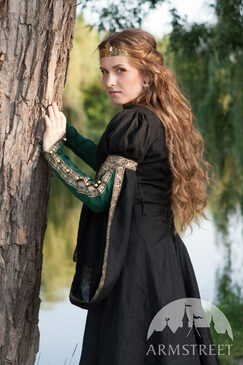Poetic Device

A discussion of "the eclipsed poem" is in order. Consider this description from Winter at www.emilyisaacson.ca/eclipsed-poetry
Eclipsed Poetry is similar to Found Poetry but introduces originality by using only words or phrases from the original text, while creating the poem with its own character, wording, and atmosphere. It is as an intersection of the sun (original text) and moon (poet and creator).
Emily Isaacson has used Eclipsed Poetry as a learning tool, and includes it in her collection The Fleur-de-lis, where it is referenced as "inspired" poetry in the end notes. She has developed this art form, and used it as her own, while imparting it to others. Further, an example of eclipsed prose from The Fleur-de-lis might be the short story Aurias which contains a scene with Opheus in the dungeon. Here she borrows from poems by one of the Bronte sisters to form the basis for her woodman's theme and his cries of anguish.
Opheus, of scarce youth, locked in manacles in an evil castle,
fought with the hag for his release—the fever on his brow:
“How cruel, Death––how like his blows to send me reeling to
the floor in merciless pitch. The firearm a dare to fate, and bind
to woodland creatures. The rending of the earthbound heart to
nature’s carnal realm, no less, a slaughtered foe, the wild hare: no
soul and body’s agony, may sink to her repose. How cruel, Death.”
“Oh, how despairing and alone, the woodman’s horn. For one’s
life perished for another’s morn and child of no less day. For he
must wear his life: an animal’s cloak, an empty skin. And lingers on
the light, faintly on, treading down the path, faintly to decay. Oh, how despairing.”
The Fleur-de-lis, Vol II, "Aurias."
Emily Isaacson is not self-taught but was schooled in creative arts and writing from a young age. She was taught from age 10 how to write poetry, and developed her own style from that point until her university years, when she took several creative writing and literature courses. Eclipsed Poetry, however, is her own creation.
Her early poetry was more likely to follow this genre, inspired by magazines, books, art and music. Postmodern poetry in its essence does reference other literature, even including it as material, whilst remaining both authentic and original to its author.
In Isaacson's next book Hallmark, she is publishing 130 new poems, and a range of older previously published poems from her other books. She might consider her famous bird poems to be eclipsed, as they are composed from material from thousands of Canadians who wrote comments on the National Geographic website for the winning bird contest in 2017. As she was unable to thank each of the contributors individually, she has said a bold corporate thank you in the end notes for their informative research.
The true "eclipsed" work may be her brush with Victor Hugo and his play Hernani. Four of her sonnets, as remarked upon in the endnotes, borrow material from this play. This would include her all-time best sonnet "When you retreat alone into the wood".
When you retreat alone into the wood,
you are familiar with places forlorn,
you bow your silver horn, a unicorn,
and the poetic verse is now your food.
Look into the bright spiritual domain,
and see if heaven’s walls are high and close,
see if the door is open thee or closed,
look to the tower, the castle maintained
an archer, with a rainbow, sky to sky,
seek in thine arsenal the armour shined
for all of sixty years—thou art still mine,
beneath all sorrows that the poor would spy,
for we are never cruel nor cold, betrothed,
our hearts glow with our kindness and our love.
--Emily Isaacson, Hallmark: Canada's 150 Year Anniversary
This sonnet references her opening quote of The Fleur-de-lis Volume I:
"Good duke, go see if thine walls be high,
And if the door is closed, and archer placed
Within his tower, and go the castle round
Thyself for us; seek in thine arsenal
For armour that will fit—at sixty years…"
Victor Hugo
Emily Isaacson by choosing this quote and reference to Victor Hugo, is preceding her manuscript of poetry with a bold request that the country of Canada and England be married to each other for 60 years or be wholly separate. She calls him a Duke before he has even received that official title, and the published books released one month before the Royal Wedding, contain both of his children's names with the title Prince George Sage, and poem "House of the Sea" mentions Princess Charlotte (as in Queen Charlotte Islands).
Picture: courtesy Armstreet Clothing Company: view here